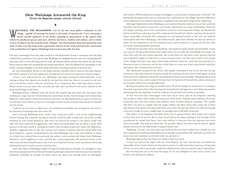Jacking In To the Matrix
Editat de Matthew Wilhelm Kapell, William G. Dotyen Limba Engleză Paperback – 31 oct 2006
Preț: 128.21 lei
Preț vechi: 147.00 lei
-13% Nou
Puncte Express: 192
Preț estimativ în valută:
24.54€ • 25.52$ • 20.56£
24.54€ • 25.52$ • 20.56£
Carte tipărită la comandă
Livrare economică 13-27 martie
Preluare comenzi: 021 569.72.76
Specificații
ISBN-13: 9780826419095
ISBN-10: 0826419097
Pagini: 232
Dimensiuni: 149 x 220 x 15 mm
Greutate: 0.37 kg
Editura: Bloomsbury Publishing
Colecția Continuum
Locul publicării:New York, United States
ISBN-10: 0826419097
Pagini: 232
Dimensiuni: 149 x 220 x 15 mm
Greutate: 0.37 kg
Editura: Bloomsbury Publishing
Colecția Continuum
Locul publicării:New York, United States
Caracteristici
Cheap paperback edition
Cuprins
Introduction: William G. Doty, "The Deeper We Go, the More Complex and Sophisticated the Franchise Seems, and the Dizzier We Feel." Issues treated in this volume; contexts of looking at the franchise.
Jacking In to Issues of Gender and Race
1 Martina Lipp, "Welcome to teh Sexual Spectacle: The Female Heroes in the Franchise." Perhaps it is time for a retelling of heroic mythology that does not masculinize the female hero.
2 C. Richard King and David J. Leonard, "Is Neo White? Reading Race, Watching the Trilogy." Ignoring the racial message of the franchise only reinforces old abuses of power.
Cultural and Religious Implications
3 Richard R. Jones, "Religion, Community, and Revitalization: Why Cinematic Myth Resonates." The roles of religious symbolism in an entertainment culture.
4 Bruce Isaacs and Theodore Louis Trost, "Story, Product, Franchise: Images of Postmodern Cinema." A postmodernist redemption myth with a control-freak messianic hero.
5 John Shelton Lawrence, "Fascist Redemption or Democratic Hope?" Embedded political values smack largely of American fascism.
6 Frances Flannery-Dailey and Rachel L. Wagner, "Stopping Bullets: Constructions of Bliss and Problems of Violence." The various religious themes do not overcome a reliance upon violent means.
Theorizing Cyberworlds
7 Michael Sexson, "The Déjà vu Glitch in the Matrix Trilogy." Literal versus ironic readings of the "reality" of our matrix.
8 Stephanie J. Wilhelm and Matthew Kapell, "Visions of Hope, Freedom of Choice, and the Alleviation of Social Misery: A Pragmatic Reading of the Matrix Franchise." This is neither a "postmodern" or "modern" franchise, but one that hopes for a better future for all.
9 Gray Kochhar-Lindgren, "Biomorph: The Posthuman Thing." Machine plus human plus computer software: thigns, they are a-changing.
The Games and Ethics of Simulation
10 Timothy Mizelle and Elizabeth Baker, "Strange Volutions: The Matrix Franchise as a Post-Human Memento Mori." Lessons about free will and choice in the new theater of "dynamic cinema."
11 Russell Blackford, "Try the Blue Pill: What's Wrong with Life in a Simulation?" The choice of the blue pill satisfies philosophical teachings.
Conclusion
Matthew Kapell, "At the Edge of the World, Again." From Star Wars to the newest franchise using many more mediations. Perhaps it is an allegory of a new aesthetic.
Appendix: Getting with the Program/s of the Franchise - Users' Information
1 List of items in the franchise, with abbreviations used in this book
2 Glossary of names adn terms in the franchise
3 Useful Internet sites
4 Recommended bibliography
Index
Recenzii
"Jacking into the Matrix Franchise: Cultural Reception and Interpretation [is] a collection of meaty essays on The Matrix's cultural meaning. Hailing from a range of scholarly disciplines, the contributors speak to the innumerable interpretations the films have inspired. This collection's strength is that it doesn't try to tell you that the Matrix films are good or bad movies. The writers are as interested in the films' failures as in their innovations, and in the opportunities they offer to take the measure of the American mind. They ask intriguing questions. I came away from Jacking convinced that the Matrix films are more than action flicks. By provoking such passionate and thoughtful responses, from academics and water-cooler philosophers alike, the series has embodied the cyborg dreams, the fears and desires, of Americans at the turn of the millennium. And that's something worth reading about." - The Boston Phoenix, 9/11/04
"Any book under the editorial leadership of Professor William Doty is an event. His authority insures that the articles have intellectual density and academic weight. Yet, what is much rarer in this kind of publication, is a style that will captivate anybody interested in understanding how we experience and interpret films. The discussion is fascinating, the ideas fresh, the bibliographies precious. The title: Jacking into the Matrix Franchise: Cultural Reception and Interpretation, is too restrictive as it may appear like it is only addressed to fans of the Matrix films (of which I am not). But the collection of articles offers much more: it is a grand tour of all the subjects that matter in film studies: gender and degenderization, race and multiraciality, evolving and contradictory definitions of male and female heroism, religious symbolism in an entertainment culture, hidden agendas and embedded political values, postmodern deconstruction and reconstruction of hope, archetypal characters showing up unannounced, the opposition of an old in the new market of spiritual values and more I am one of those who, twenty some years ago, immensely enjoyed Baudrillard's Simulacra and Simulation (1981). Doty and Kapell's collection of articles are the best update on the subject I have read since. I am ready to bet my copy of Bound (another Wachowski brother's movie), that Doty and Kapell's collection of articles will become a classic in film studies. I think of Bound as the best film ever made about trust (as well as a superb thriller); it did not attract the fame of the Matrix, and reading Jacking into the matrix Franchise help me understand why." - Ginette Paris, PhD. Pacifica Graduate Institute, Spring Journal 2004
"Two things distinguish this useful mapping of the Wachowski brothers' Matrix film trilogy... First, its range of contributors... second, the editors' insistence on conversational writing makes for an uncommon accessibility.... Recommended." -Choice, January 2005
"Any book under the editorial leadership of Professor William Doty is an event. His authority insures that the articles have intellectual density and academic weight. Yet, what is much rarer in this kind of publication, is a style that will captivate anybody interested in understanding how we experience and interpret films. The discussion is fascinating, the ideas fresh, the bibliographies precious. The title: Jacking into the Matrix Franchise: Cultural Reception and Interpretation, is too restrictive as it may appear like it is only addressed to fans of the Matrix films (of which I am not). But the collection of articles offers much more: it is a grand tour of all the subjects that matter in film studies: gender and degenderization, race and multiraciality, evolving and contradictory definitions of male and female heroism, religious symbolism in an entertainment culture, hidden agendas and embedded political values, postmodern deconstruction and reconstruction of hope, archetypal characters showing up unannounced, the opposition of an old in the new market of spiritual values and more I am one of those who, twenty some years ago, immensely enjoyed Baudrillard's Simulacra and Simulation (1981). Doty and Kapell's collection of articles are the best update on the subject I have read since. I am ready to bet my copy of Bound (another Wachowski brother's movie), that Doty and Kapell's collection of articles will become a classic in film studies. I think of Bound as the best film ever made about trust (as well as a superb thriller); it did not attract the fame of the Matrix, and reading Jacking into the matrix Franchise help me understand why." - Ginette Paris, PhD. Pacifica Graduate Institute, Spring Journal 2004
"Two things distinguish this useful mapping of the Wachowski brothers' Matrix film trilogy... First, its range of contributors... second, the editors' insistence on conversational writing makes for an uncommon accessibility.... Recommended." -Choice, January 2005
Descriere
This entirely new collection of essays is the first book to examine the trilogy as a whole - as well as related products such as The Animatrix and the computer game.














